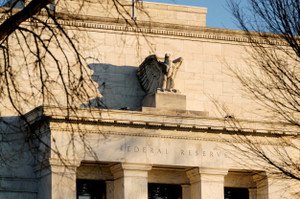Central banks' green push hits a hurdle as Fed drops out
Published by Global Banking & Finance Review®
Posted on January 20, 2025
3 min readLast updated: January 27, 2026

Published by Global Banking & Finance Review®
Posted on January 20, 2025
3 min readLast updated: January 27, 2026

The Fed exits the NGFS, affecting global climate efforts by central banks. The ECB continues its climate initiatives amid political challenges.
By Francesco Canepa and Virginia Furness
FRANKFURT (Reuters) - A global effort by central banks to join the fight against climate change has hit a major hurdle with the U.S. Federal Reserve's decision to leave a club devoted to policing environmental risk in finance.
The Fed said on Friday it would quit the Network for Greening the Financial System (NGFS) because it had "broadened in scope, covering a wider range of issues that are outside of the (Fed's) statutory mandate".
Launched in 2017, the global body of central banks and regulators has mostly produced reports, including climate scenarios that supervisors use when estimating the effects of climate change on the economy and financial sector.
Coming just before Donald Trump's inauguration as U.S. President and amid a backlash against climate action on Wall Street, the Fed's move was widely interpreted as a sign the political climate has become less friendly to environmentalism.
"The financial consequences of climate change are growing - and the most important central bank gives in to changing political wind," said Guntram Wolff, professor of economics at Solvay Brussels School, part of Brussels University.
The NGFS remains "more resolved, committed and enthusiastic than ever", it said in a statement, adding that the Fed had not been a member of its steering committee.
Without the Fed, the biggest and most influential of the 143 members of the Paris-based NGFS is the European Central Bank.
Under President Christine Lagarde, it has incorporated climate change both in its monetary policy, via a short-lived tweak to its bond purchases, and in its work as supervisor of the 20-country euro zone's top banks.
CRITICS
But the ECB's activist stance on climate has been criticised by some European politicians and even a central banker.
Such sceptical voices might now be emboldened by the Fed's decision to leave the NGFS, said Stanislas Jourdan of the Sustainable Finance Lab think tank.
"This news about the Fed should wake up political forces in favour of the green transition in Europe to support the ECB's climate endeavour," Jourdan said. "With more political support, we could double down with more proactive policies such as a green interest rate."
Such an initiative would see commercial lenders that finance environmental projects charged less to borrow from the ECB.
The ECB's actions so far have had only a minimal impact on borrowing costs. A study by its own staff found that between 2018 and 2022, the euro zone's most polluting firms paid on average just 14 basis points (0.14 of a percentage point) more to borrow than their cleanest peers.
An academic paper published in 2023 and commissioned by the European Parliament found the ECB had only "a limited role" to play in the fight against climate change and that supporting the green transition might clash with its duty to control inflation.
And a draft report approved last week by the Parliament's economic affairs committee, which oversees the ECB, welcomed its climate-focused stress tests of banks but said it should remain "as apolitical as possible" when conducting monetary policy.
But James Vaccaro, head of the Climate Safe Lending Network and CEO of sustainable business consultancy Re:Pattern, said the ECB should continue to lead on green issues.
"There is no logical reason for it (the ECB) to row back. (Managing climate risk) is critical for the European economy and for financial stability," Vaccaro said.
(Editing by Catherine Evans)
The Fed decided to quit the Network for Greening the Financial System because it had broadened its scope to cover a wider range of issues outside the Fed's statutory mandate.
The European Central Bank has incorporated climate change into its monetary policy and supervises the euro zone's banks, although its actions have faced criticism for having minimal impact on borrowing costs.
Despite the Fed's departure, the NGFS stated it remains committed and enthusiastic about its goals, emphasizing that the Fed was not part of its steering committee.
The Fed's exit may embolden critics of climate action in Europe, prompting calls for increased political support for the ECB's climate initiatives.
A study commissioned by the European Parliament found that the ECB has only a limited role in combating climate change, suggesting that it should remain apolitical in its approach.
Explore more articles in the Finance category
